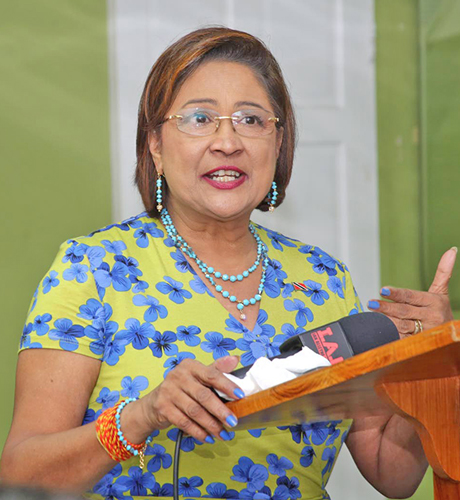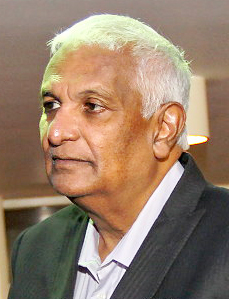Trinidad & Tobago
Persad-Bissessar - 50,000 jobs
for unemployed

Port-of-Spain – Opposition Leader, Kamla Persad-Bissessar told an enthusiastic audience a UNC government will create 50,000 jobs. Persad-Bissessar made the promise on Sunday at the party's 30th anniversary celebrations at the party’s Couva South headquarters.
The UNC was also placed in election mode, with Persad-Bissessar announcing screening of over 400 nominees, which will begin in May for local government elections.
Persad-Bissessar also issued a warning to Prime Minister Dr Keith Rowley and the PNM, saying: “I want to give Rowley a warning that we know what is going on and what he and his party are planning for elections. And I want to give him the assurance that we have no intention of allowing him and his cronies to rig the election now, and use the campaign period as a theatrical show, and then relegate election day as a sham activity to legitimise electoral democracy in Trinidad and Tobago. We in the UNC are not making joke on this matter,” she told the cheering crowd.
She said the UNC will not allow the electoral system to be “hijacked by political pirates posing as an authoritarian government”.
Persad-Bissessar directed parts of her address to unemployed university graduates, and former Petrotrin workers, vowing to create 50,000 jobs if returned to office.
Saying she empathises with the pain and frustration graduates are feeling having studied and now being without jobs, Persad-Bissessar said, “Do not give up... I promise you today that we will make, as our first priority, the creation of 50,000 well-paying jobs. We did it before. We will do it again.”
Persad-Bissessar said her government will immediately restructure the health sector to make it a hub for medical tourism that will employ doctors, nurses, and healthcare providers.
Foreign missions will be mandated to identify the jobs of the digital future, she said.
Also, a UNC government will leverage the expertise in the energy sector and carefully match that with manpower needs in nearby Guyana, to the mutual benefit of both countries.
“You have a choice. You can vote PNM and continue to suffer. You can sit on the fence and allow the PNM to snatch victory despite their despicable disregard of your interests. Or you can vote UNC and hold us to our promise. As it stands, you have everything to gain by voting for my party,” Persad-Bissessar said.
Persad-Bissessar also turned her attention to former Petrotrin workers, wondering how the unemployed from this company not vote against the “callous” act by the government to fire the 10,000 workers.
Petrotrin made over (TT) $1.7 billion in profits, contrary to the government’s claims it was an albatross losing money.
“Instead of you benefiting from profit-sharing agreements, you were fired,” she said.
Persad-Bissessar pointed to a former manager, an engineer, who lost medical benefits for himself and his wife, which were promised for the remainder of his life. Now he was only entitled to two years of medical treatment.
“Not one of the 10,000 workers fired from Petrotrin should even consider not voting in this election for the UNC. I call on this government to stop the sale of the Petrotrin refinery and call elections now!” she said. She also called on former workers to help return the UNC to the government.
Persad-Bissessar also promised her government would be a friend to small businessmen and make them a priority.
“You now know that you are not immune to PNM vindictiveness, spite, and incompetence. You are now taxed using every imaginable creative device. You now know that your customers do not have the disposable incomes to buy your goods,” she said.
Persad-Bissessar said the taxes of small businessmen are being squandered on fattening the pockets of the PNM though rental of buildings and “overpriced contracts whether for boats or ferries, or for million-dollar scandals like fake oil”.
She said small businesses are being starved of foreign exchange and are suffering the impact.
“You are being starved into extinction... It is no longer time to sit on the fence. Your survival depends on our country moving away from this government,” she said.
conscience’ - Dookeran

Said Dookeran: “It is a real tragedy. It is part of the larger political situation because it is producing tragedies for human lives. It is beyond the humanitarian issue, and it is at the stage of putting ordinary people at risk who are in search of survival.”
Additionally, “It touches your conscience when people are in search of survival. Your heart goes out to the people who have lost their lives. The incident has to be seen in its historical context. There has always been migration of people in the world, and they have lost their lives fleeing untenable conditions. It happens in many parts of the world, and this is close to home, so we are more affected and impacted.”
Linking the flight of Venezuela’s people with Trinidad and Tobago’s history of migration, Dookeran noted: “East Indian immigration happened about 150 years ago, and in contemporary times, we should not see it as a natural course. It will continue. There should be a step-by-step solution. It is about engaging all the parties, including the [Nicolas] Maduro regime and the Opposition [Juan Guaido]. The United Nations Secretary General [Antonio Guterres] has a moral legitimacy to initiate diplomatic action on matters of such tragic loss of lives, whether it in this area or any other area. It is a life-and-death issue. It is no longer a human rights issue.”
He also noted with approval the comments made on the crisis by the newly-installed moderator of the Presbyterian Church Rev Joy Abdul-Mohan. Last week Abdul-Mohan said the Presbyterian Church was considering opening its schools and places of worship to Venezuelan migrants and refugees. She also noted sister Presbyterian churches in Canada and the US have opened up doors to refugees.
Dookeran noted the situation with Venezuelan’s fleeing was “quite intolerable” and “heartbreaking”, declaring, “It adds to the urgent need to find some solutions. It should be resolved in stages. There should be a coming together on the issues of migration. Now I think Trinidad and Tobago might wish to take an initiative in stages to prevent things like that from happening again.”
He also noted, “It also tells us about the need for urgency. It should be not just seen as news... as just a sea tragedy, but as heart-wrenching incidents that stir us into finding another solution, and another way of looking at things.”
Late last week, friends and relatives of the occupants of the vessel that went down in choppy waters between Venezuela and south Trinidad continued praying for a miracle. However, hope began to fade following the return to shore of a search-and-rescue vessel carrying the body of a young woman. Relatives on vigil by the Trinidad shore rushed to identify the battered corpse. While a few walked away with relief and its thinning thread of hope, relatives of Mili Lezama, one of the missing women, collapsed with grief.
A young woman from Guiria, Lezama said goodbye to her mother and relatives on Tuesday night, leaving Venezuela behind on an overcrowded fishing pirogue, the B/P Johnnaly Jose. She was sailing to potential employment, leaving with a promise to relatives to send part of her earnings back for the purchase of food.
Lezama did not have a passport or any documentation to legally enter Trinidad and Tobago. She was in the packed vessel sailing under the cover of darkness, docking in quiet coves and bays along the Gulf of Paria’s coast. Her body was recovered by Venezuelan Coast Guard divers near the wreckage.
According to Venezuelan officials the fishing vessel encountered engine problems and capsized ten minutes after departure, east of the uninhabited Los Patos Island by the Dragon’s Mouth. Its captain and a 26-year-old mother of two were rescued two hours following the accident.
In the following days, Trinidad and Tobago’s Coast Guard and Venezuelan fishermen assisted in the search, locating and rescuing nine people. Sixteen persons are still missing. Earlier this week, divers were searching the site for more bodies.
Approximately 40,000 Venezuelans are believed to be now living in Trinidad, while about 10,000 have registered as asylum-seekers with the United Nations refugee agency. Refugees in Trinidad currently have no employment rights, which forces them to work illegally. Recently the government announced an amnesty for all Venezuelans in the country, including those who entered illegally. Registration allows its recipients to work legally for one year.
accusation for WASA
Following their complaints, chairman of the Penal/Debe Regional Corporation Dr Allen Sammy leveled the bias accusation against WASA.
Sammy said last week WASA officials Anand Jagganauth and Sherland Sheppard visited his office following news coverage that the water shortages were at critical mass in his district.
He said both officials “listened attentively to my complaints that villagers, businesses, schools and public offices are suffering”.
Following that meeting, Sammy said he received a call from Public Utilities Minister Robert Le Hunte. He was told water had been cut in certain areas to facilitate repairs to pipelines.
However, Sammy disputed this explanation, saying, “Repairs were not done throughout the entire Penal/Debe area. This is why I am saying it is discrimination.”
He said it was obvious there is a proper supply of water for people in the north and in certain areas in central.
“Yet south people are starving for a supply,” he maintained.
Late last Friday, Sammy said he received a call from someone claiming to be from WASA's security department asking for the names of those who had complained about WASA.
“Why would security call for a list when my office already made a complaint?” he asked.
Sammy said he will not sit idly by and allow the people of Penal/Debe to suffer for basic amenities like water. Water shortages in the dry season are not new, but this year south residents are being made to suffer, and he needed answers as head of the PDRC.
Sammy indicated Penal residents were spending thousands of dollars to buy water for daily use. He said there has also been talk about a conspiracy between WASA staff and private contractors who sell water.
Said Sammy: “In these hard economic times residents are forced to spend (TT) $500 to $800 for a tank.”
Rupert Jaisingh from Debe Main Road said he believes WASA staff are managing the flow of water to these areas.
Jaisingh claimed: “When the trucks sell the water at a high cost, WASA officials get a percentage from private contractors.”
for cancer patients
Thomas also thanked RBC Royal Bank for its “humanitarian gesture” in assisting with the funding for the equipment.
The flow cytometer is a diagnostic instrument used to analyse blood samples and bone marrow cells, to determine whether a high presence of white blood cells is as a result of cancer, particularly in children.
Health Minister Terrence Deyalsingh lauded the difference the flow cytometer would make in improving the healthcare of children. He thanked RBC for doing “so much good for hundreds of children”.
Said Thomas: “It is a new piece of technology; it is an expensive piece of equipment. It costs about (TT) $2.5 million. RBC will facilitate the cost of using it for two years. The premier cancer specialists are at Mt Hope, especially those who work in the field of paediatrics. We are ecstatic to have the flow cytometer because it will impact positively on the lives of children with various blood cancers.”
He added: “It will position Mt Hope as a ‘centre of excellence’ because it is the only one of its kind in the Caribbean. Before, Dr Curt Bodkyn (paediatric oncologist) and our team sent samples to the US. Now it can be done at home. This piece of equipment really puts us on the cutting-edge of medical technology. The staff and the executive management are now able to benefit from accessibility. The cancer list would become more compressed. We would also be able to accommodate referrals from the other Regional Health Authorities.”
